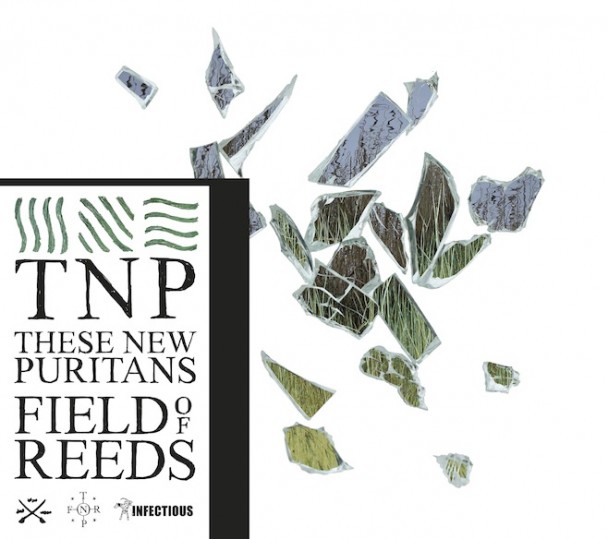We’ll never see the likes of “Elvis” again. Three albums in, These New Puritans have yet to feel strongly enough about a sound they’ve created to revisit it, constantly tampering with their ratio of post-punk and avant-garde, driven by the compulsion to achieve Xiu Xiu or Liars-like transformations with each release. After the not-so-surprising success of their sophomore effort Hidden, a rattling, percussion-heavy affair, they’ve pulled back considerably, nearly as much as they possibly could have. The transformation alone is worth listening to, though the songs aren’t as outwardly adventurous in the way their earlier efforts were.
Field of Reeds is in many ways antithetical to what came before it, a sea change radical enough that frontman Jack Barnett apparently considered changing the band’s name. Informed by a laundry list of genre progenitors, including John Cage and Messiaen, Kid A and Talk Talk, Field of Reeds’ intellectualism and influences shout much louder than the music upon first listen. Secrets aren’t easily given up, which is as much a result of the stylistic choices as it is the songwriting. The aptly-titled “Organ Eternal” is so entrancing that the squalls and strings embroidered within almost need to be deliberately sought out. Even standout “Fragment Two,” with its pretty, stutter-step piano and lyrical abstractions, requires due diligence before it opens up to reveal its guileful depths.
Although Field of Reeds is just as challenging as anything in the band’s catalogue – possibly even more so –it doesn’t demand your attention in the same way. The songs are by most accounts hookless and free-floating. Instead, a sudden cymbal crash or peripheral horn will appear and politely point you in the direction of other details buried under the occasionally impenetrable surface. Rarely does anything jump out, which makes the record’s bristlier moments even more marked. The title track alternates between an ominous baritone choir and chirpy woodwinds and resonator pianos before overlapping them with one another, so the former can engulf the latter. “The Light in Your Name” creeps up on you quietly, before descending into methodical bedlam in its final moments, drowning in buzzing horns, shattered glass and a hailstorm of drum rolls.
The muted, introverted qualities in these songs certainly aren’t achieved at the expense of the menace. Barnett’s voice never abandons his breathy, loose-tongued drawl, and his vocals seem as inseparable from and essential to the arrangements as any instrument. Nine-minute juggernaut “V (Island Song)” masterfully ratchets up the tension for two minutes before a krauty, gothic beat kicks in, paving the way for Barnett’s unsettling mumblings that he’s “not the suspect, not the victim.” The lyrics in general are applied sparingly here, but they carry an air of the unknowable, which only augments the impression of claustrophobia. Providing assistance on this front is Portuguese vocalist, Elisa Rodrigues, who proves a worthy foil and adds a sense of contrast to the record, particularly on the eerie but pillowy “Dream.”
Pinned up and thoroughly artistic, Field of Reeds is affecting, but it’s also hard to get genuinely excited about. Even so, it is a worthy entry into These New Puritans’ ever-evolving catalogue. But even more that the reinvention that it represents, this album is defined by this sense of omniscient foreboding. It’s a record smart enough to know the limitations its setup presents, and instead fiddles with permutations and combinations to achieve these ends.

